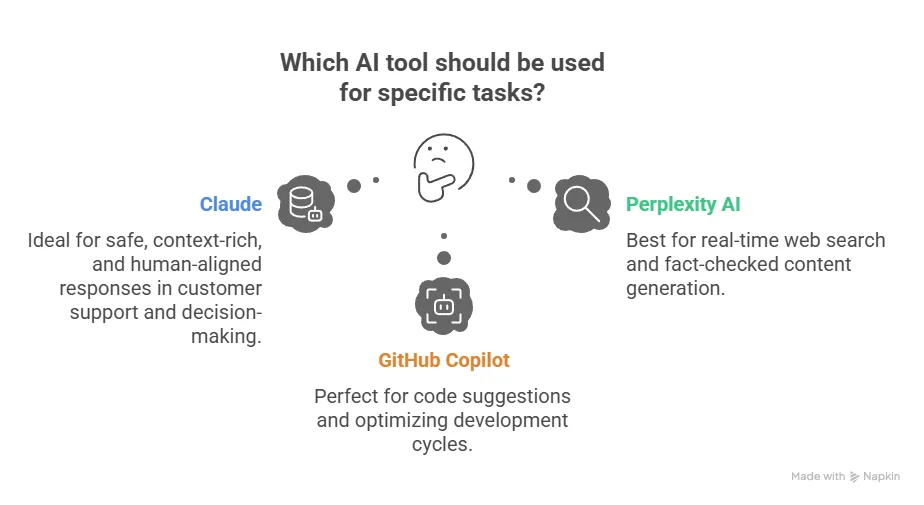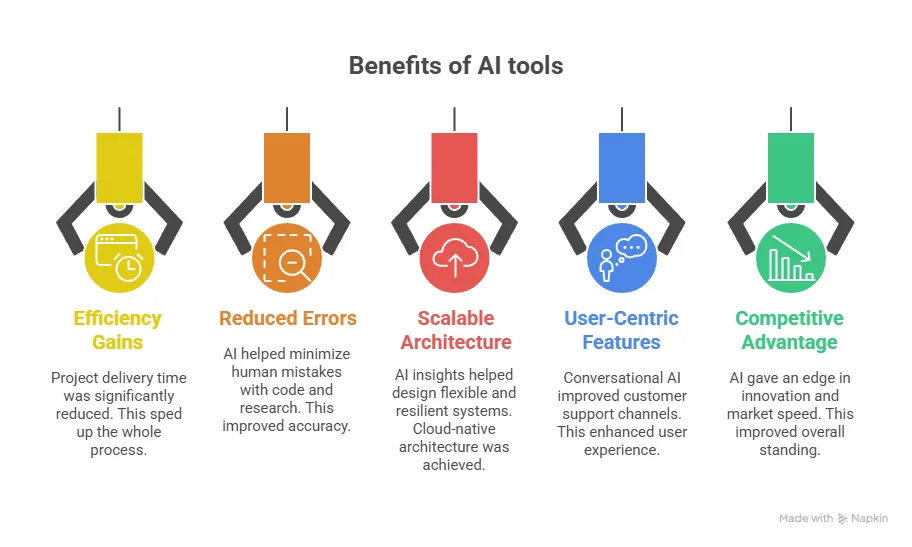In recent years, the rapid adoption of Artificial Intelligence (AI) has changed the way we design, develop, and scale digital platforms. When I look at the evolving technology landscape, I see a major shift driven not just by traditional coding or automation, but by AI-assisted platforms such as Claude (Anthropic), Perplexity AI, and GitHub Copilot.
In today’s digital economy, every organization is racing to create platforms that are scalable, intelligent, and future-ready. Over the past few years, I have worked closely with AI-driven tools such as Claude, Perplexity, and GitHub Copilot, and the transformation they bring is undeniable. These platforms are not just productivity boosters—they are reshaping how we design, build, and deliver technology solutions.
When we talk about future-ready platforms, we mean solutions that adapt to change, integrate seamlessly with evolving technologies, and anticipate user needs. Artificial intelligence is at the heart of this evolution. Tools like Claude for natural language understanding, Perplexity for research and knowledge discovery, and Copilot for code generation and automation allow us to reimagine product development with agility and precision.
The real question is: How can these AI tools help us build platforms that are not only efficient today but also future-ready?
In this blog, I will share my perspective and experiences of using these AI solutions to accelerate innovation. The discussion will highlight how these tools transform research, development, customer experience, and long-term scalability.
Understanding the AI Tools in Context

Before answering the main question, it’s important to understand what makes Claude, Perplexity, and Copilot unique in their own space:
-
Claude (Anthropic AI) – Built around Constitutional AI, Claude is a conversational AI tool that focuses on safe, context-rich, and human-aligned responses. For platform builders like us, it provides reliable natural language understanding, which is crucial for customer support systems, workflow automation, and decision-making processes.
-
Perplexity AI – This tool is often called the AI-powered search assistant. It combines conversational intelligence with real-time web search, ensuring the information provided is updated and credible. For us, it means faster market research, instant competitor analysis, and fact-checked content generation.
-
GitHub Copilot – Powered by OpenAI’s Codex, Copilot acts as an AI programming partner. It suggests code snippets, optimizes syntax, and reduces development cycles. From my experience, this has transformed the way developers approach projects, reducing time-to-market drastically.
The Core Question: How Can They Build Future-Ready Platforms?
Future-ready platforms are those that can adapt, scale, and stay relevant in a world where technology shifts every few months. Based on my journey, here’s how these AI tools are contributing:
1. Enhancing Productivity Through AI-Assisted Development
We cannot deny the pressure of delivering fast and error-free digital products. With Copilot, my team and I have seen productivity increase significantly. Instead of spending hours debugging, we receive real-time code suggestions and optimization tips. This allows us to focus on higher-level architecture and innovation rather than routine coding.
For example, when building enterprise solutions, Copilot acts like a pair programmer, reducing technical debt while improving code quality. This makes the platform sustainable for future scaling.
2. Improved Decision-Making with Reliable AI Insights
In my experience, making data-driven decisions has always been a challenge, especially when information overload clouds judgment. Here, Perplexity AI plays a game-changing role. Its ability to combine real-time search with conversational AI ensures that our business insights are both fresh and verified.
When we explore new market opportunities, Perplexity helps us analyze competitors, identify consumer trends, and validate sources instantly. This gives us confidence that our platforms are designed for future demands, not outdated assumptions.
3. User-Centric Design with Conversational AI (Claude)
No matter how advanced a platform is, user experience remains the ultimate benchmark of success. Claude helps us design customer-facing systems that are natural, empathetic, and contextually aware.
For example, when we integrate Claude into support systems, users feel like they are engaging with a human assistant rather than a bot. This level of personalization builds trust, enhances adoption, and ensures that the platform is sustainable in the long run.
4. Scalability and Adaptability
Future-ready platforms must scale quickly and adapt to dynamic business conditions. Copilot reduces development bottlenecks, Claude ensures customer systems scale without friction, and Perplexity provides real-time insights that guide pivoting strategies.
Together, they form a triangle of sustainability:
-
Copilot → Development agility
-
Claude → Customer trust
-
Perplexity → Strategic intelligence
From my professional journey, this synergy has helped us build solutions that not only meet today’s requirements but are also flexible for tomorrow.
5. Reducing Operational Costs
Efficiency is not just about speed; it’s about cost optimization. By adopting AI-driven research (Perplexity), support automation (Claude), and coding efficiency (Copilot), we cut down operational costs significantly.
For businesses, this means redirecting resources toward innovation and market expansion rather than repetitive tasks.
6. Building Ethical and Responsible AI Platforms
Future readiness is not just about technology; it’s also about responsibility and compliance. Claude, with its focus on safe AI practices, ensures that we design platforms that are aligned with ethical guidelines and legal frameworks.
This is particularly important for sectors like finance, healthcare, and education, where trust and compliance are non-negotiable.
7. Empowering Teams Beyond Developers
One of the misconceptions I used to have was that these tools only serve developers. But in reality, marketing, research, sales, and support teams benefit equally.
-
Perplexity helps marketing teams draft SEO-friendly content based on real-time trends.
-
Claude empowers customer support teams with empathetic automation.
-
Copilot reduces dependency on senior developers by assisting juniors in writing quality code.
This democratization of AI ensures that the entire organization is ready for the future, not just the technical wing.
Key Benefits I Experienced Using Claude, Perplexity & Copilot

-
Efficiency Gains – Project delivery time reduced by nearly 30–40%.
-
Reduced Errors – AI-driven code generation and automated research minimized human mistakes.
-
Scalable Architecture – AI insights helped us design flexible, cloud-native, and resilient architectures.
-
User-Centric Features – Conversational AI powered by Claude enhanced customer support channels.
-
Competitive Advantage – Leveraging AI gave us an edge in innovation and speed to market.
These are not just abstract benefits—I have seen measurable improvements in project outcomes when integrating these tools.
Challenges & How I Overcame Them
No AI journey is without challenges.
-
At first, I worried about over-dependence on Copilot, but I learned to treat it as an assistant, not a replacement.
-
With Perplexity, verifying facts was important, as AI summaries can occasionally miss nuances.
-
For Claude, aligning tone with brand voice required some fine-tuning.
Through trial, feedback, and iteration, I ensured these tools added value without compromising quality.
The Future of AI-Driven Platforms
Looking ahead, I believe AI tools will evolve into integrated ecosystems where research, communication, and development converge seamlessly. Instead of jumping between tools, we may soon operate within unified AI workspaces. The key will be human-AI collaboration—using AI to amplify, not replace, human creativity and judgment.
FAQs
1. How does Claude differ from ChatGPT in building future-ready platforms?
Claude emphasizes safety and constitutional AI, making it highly suitable for platforms that prioritize ethical AI usage, especially in sensitive industries.
2. Can Perplexity AI replace traditional market research tools?
Not entirely, but it complements them by offering real-time, AI-driven insights, which traditional methods cannot provide instantly.
3. Is GitHub Copilot reliable for enterprise-level development?
Yes. While human oversight is necessary, Copilot significantly accelerates enterprise-grade development by reducing repetitive coding tasks and ensuring cleaner syntax.
4. How can AI tools help reduce costs for startups?
They minimize manual workload, streamline research, automate support, and speed up coding—allowing startups to scale faster with fewer resources.
5. Are these AI tools secure for integration into business platforms?
Yes, but integration must be done with proper data governance and compliance policies to ensure security and ethical use.
Resource Center
These aren’t just blogs – they’re bite-sized strategies for navigating a fast-moving business world. So pour yourself a cup, settle in, and discover insights that could shape your next big move.
What Industries Benefit the Most from AI Development Services?
Top Industries Transforming with AI Development Services Artificial Intelligence is no longer an experimental technology reserved for research labs. It has become a strategic growth engine across global markets. [...]
Should You Hire an In-House or Remote .NET Developer?
In today’s competitive digital ecosystem, the success of your software product often depends on one critical decision — how you hire your .NET developer. Whether you are building enterprise [...]
How Much Does It Cost to Build a Generative AI Solution?
Generative AI is no longer an experimental technology—it is a business accelerator. From AI-powered chatbots and intelligent document automation to custom large language model (LLM) integrations and AI copilots, [...]

